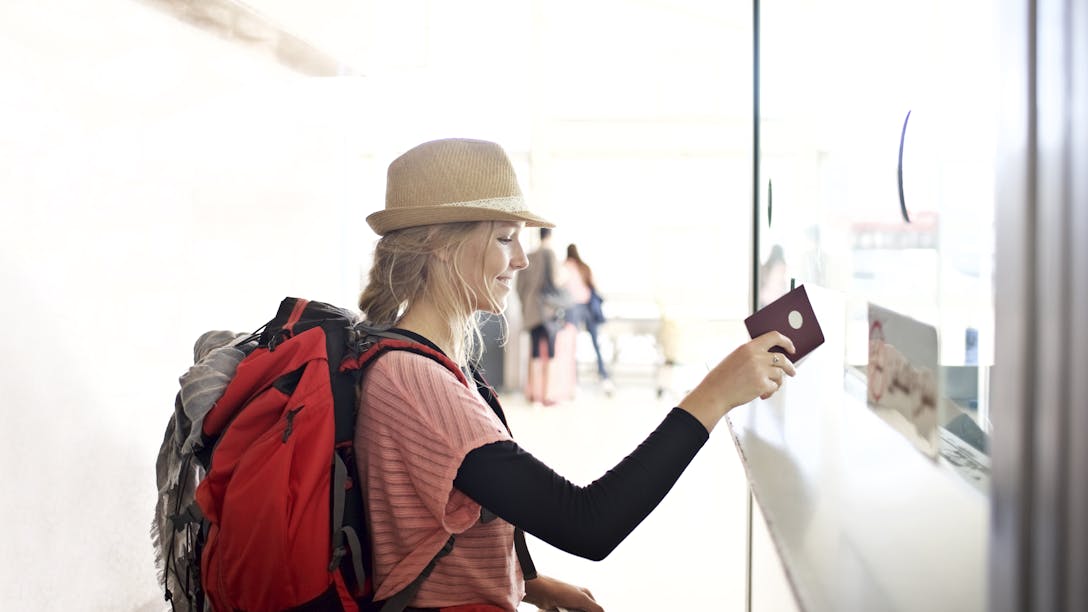
mobility|4 mins Read
December 7, 2021
The Covid-19 crisis has turned the tourism economy upside down. While new trends are emerging for travelers, such as slow tourism, all tourism operators must adapt to the new ways people are choosing to travel.
Erick Morazin, Senior Vice-President Global Travel and Xavier Blanchard, Head of Specialized Insurance, both working at AXA Partners, look back at the last two years and analyze the next challenges for the travel insurance industry.
Erick Morazin: Tourism has been one of the main industries affected by the recent Covid-19 pandemic, with average business revenues falling by nearly 50% for the sector over the past 18 months, affecting more than 150 million jobs worldwide. Our partners and destinations are just starting to recover from this unprecedented crisis. They are getting some help thanks to the strong demand from customers who want to travel again after months of lockdown in their home countries.
For the moment, and while awaiting a more global opening of borders, the destinations favored by travelers are still those of nearby countries. Airlines, countries or even accomodations that have been able to communicate better on their safety and health security measures are preferred by travelers. One example is Dubai, where hotels have reached over 90% occupancy since the borders were opened.
New consumption patterns have also emerged and some sectors have enjoyed new interest, such as rental accomodations and motor homes. It is as if travelers were looking to isolate while traveling and recreate a "health-safety bubble" during their trip away from home.
Those new forms of tourism wil remain and grow. Among new trends, I am thinking of "workation", this new way of working while traveling, encouraged by the rise of distance working, or "slow tourism", which consists of going on a longer trip rather than multiplying several short stays. Those new trends have many advantages: they reduce mass consumption, increase the discovery of different regions and develop green tourism, respectful of local populations, nature and climate. I truly believe in these new ways of traveling. Operators are getting organized to better respond to these new needs.
Tourism will become more responsible and operators are adapting to this new demand.
Xavier Blanchard: On my side, I would simply point out the widespread need for "last minute" booking. In this context of uncertainty, planning a trip is difficult: it is booked at the last moment, and so is the insurance to cover it. This is a unique and unprecedented situation that is forcing all players to develop a new flexiblity. Additional charges for changes in itinerary will be applied again, but maybe not in a standardized way, and each of us will probably keep a preference for the most flexible tour operators.

EM: The sanitary context over the last 18 months has profoundly changed the needs. Traveler's and their families' health security and safety have become essential concerns. Tourists want to be protected and our partners know it.
As early as June 2020, a few weeks after the crisis began and as the end of the first European lockdown approached, Lufthansa, TUI (Europe's leading tour operator), Etihad, Ethiopian Airlines, Cathay Pacific and other operators asked us to build travel insurance and assistance products into their services. At AXA Partners, we already had a good understanding of these distribution methods, thanks to our experience in the credit cards sector. We were therefore a pioneer in the launch of these new products. We have also just signed a long-term partnership with Etihad to offer their passengers (as an option) travel insurance products that are customized based on the traveler's profile.
XB: The quality of our partnerships was strengthened at the beginning of the epidemic, when we defined our coverage rules. We had to make sure, with our partners, that all our customers were fully informed. The whole company has been involved in providing our partners with tools adapted to this mass communication. We have gone from a price negotiation approach to a real mutual understanding of risks and the definition of a common strategy.

Together we will guarantee the full satisfaction of travelers! This is a long-term evolution, which must continue and grow.
XB: The pandemic is a real learning curve for the insurance industry, beyond the financial aspect. The first challenge is the clarity of commitments, what is covered and what is not, and the readability for the final customer. For an international insurer, consistency in its positions is essential to credibility, and the pandemic has put this consistency to the test, sometimes in a very dramatic way. In travel insurance, the commitment we took and communicated in the early days of the pandemic was simple and shared with our partners and travelers, to avoid misunderstandings.
The second issue concerns our assistance to travelers, and the very specific conditions in which we provide it. Travel restrictions, travel-related conditions, saturation of local medical networks, are conditions that could extend into 2022, even beyond, and which create a new demand. We need to help travelers with orientation, planning and offer them more interactivity during the trip. These are new expectations, a new complexity, and insurers who have control over their operational assistance activities are strenghtened by this situation.
The third trend that is emerging, and I could have started with this one: the "raison d'être" of travel insurance has never been as clear as it is today. And the mission statement, the clarity of the commitments, the customer experience offered are what is going to make all the difference. We are on the cusp of a period of great opportunities for insurers who take advantage of them.
EM: The travel insurance market, which is a niche market of approximatively 18 to 20 billion euros in sales worldwide, has experienced somes changes over the past few months. Indeed, some local or regional insurers, which had been active for many years, have decided to suspend their activities in the travel insurance sector. Our business is based on providing very specific services (medical assistance, medical repatriation from anywhere in the world, etc.), on a global geographical presence (our partners want a single provider for all the countries where they are present) and on a specific risk with low severity but high frequency (as we saw again during the Covid-19 crisis).

EM: Tourism has always recovered from crisis. Operators and destinations have adapted and quickly communicated the measures taken to fight against the consequences. Travelers will continue to protect themselves by favoring the transportation modes and accomodations that they feel are the safest. They will over-consume travel insurance and assistance products (as we are already seeing happen) to protect themselves and their families in case of problems during their stays. Tourism operators (carriers, tour operators, distributors, accomodations...) will adopt a reassuring communication to convince customers to travel again.
So I think we will have to wait until 2023 or even 2024 for the world to fully recover its 2019 activity and especially for tourism to return to its past volumes and growth levels.
However, we are seeing some recovery in travel right now (and have been for several months) with very strong growth in travel insurance sales. This trend should, in my opinion, be sustainable and continue to drive our business for the next 5 or 6 years. Indeed, the Covid-19 pandemic is not over (we are currently seeing it with a new variant) and the need for protection will remain very strong among travelers for a long time.

Destinations will invest over the next few months to promote the advantages of their regions and tourist sites, certainly focusing on more responsible tourism.
The AugmentedExperience.Travel platform is an essential knowledge base of the travel market, the needs of operators and their customers.
AugmentedExperience.Travel is a great way to innovate, allowing us to constantly adapt our products and services to the new needs of travelers. It also contains a base of essential guarantees, covering for example denied boarding, quarantine periods, missed departures or stay extensions, which remain key requests from tourists at the moment. The same applies to medical and non-medical assistance if a traveler contracts Covid-19, for example.